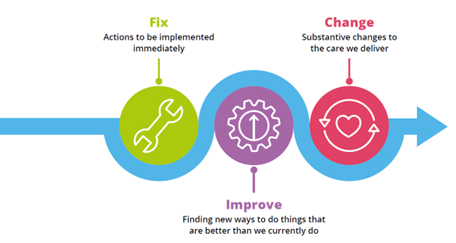Adult Critical Care Transfer Services (ACCTS) – retrospective evaluation of services
This included reviewing activity and transport data for the services for the last two years, mapping the service configuration in each of the five Integrated Care Systems (ICSs) in London, and gathering insights into what has been working well and areas for improvement. Other transfer services based in London as well as ACCTS elsewhere in the UK also informed the review.
What did we do?
The evaluation unearthed reflections and thoughts about future services, beyond those which were anticipated. The services who were spoken to were engaged and invested in improving and developing future ACCTS in the capital. Quantitative as well as qualitative methods were used in order to gather insight from the teams, with nearly 30 hours of semi-structured interviews undertaken with staff.
For each of these categories, we were able to highlight areas that are working well, challenges to be addressed and recommendations for the future. These recommendations represented improvements and changes across a wide spectrum, from quick fixes, actions that can be implemented immediately, to improvements, that present new ways to do things that are better than today, through to changes that are more substantial changes to how the services are configured and delivered.

Our conversations provided in depth insight into the services currently running, but focussed on some key areas which were felt to be valuable in informing future services. These included discussions around:
- The impact of services on inequalities and reflections on how to minimise inequities in the future
- Details of the workforce, their skill mix and their relationship with provider teams in their host trust
- The logistics and processes set up by the services
- Resources, vehicle and equipment requirements, including practical considerations as well as their suitability and required standards
- To what extent services were able to engage patients and families, what support was provided, what communication was provided and how any feedback was, or could be, gathered
- How the services worked alongside local hospitals, ICUs, regional teams and other transfer services
Key findings
Activity volume and reasons for transfer have changed over time
It was found that activity volume within existing ACCTS and the reason for these transfers has changed over time, remaining relatively stable since April 2021, following the second peak of COVID hospital admissions. Specifically, transfers for capacity reasons have greatly reduced with patients primarily being transferred in order to escalate their care or gain access to specialist services.
Service configuration varies across the five ICSs in London
Within existing services, a considerable amount of variation in how they are run was found. This has been driven by the need to ensure that the services meet local needs as well as the speed at which the services needed to be set up at the start of the COVID19 pandemic. Services also differed in their approach to time critical transfers, the skill mix in their staffing models, their level of integration with provider services and their outlook on transfers for decompression or capacity reasons.